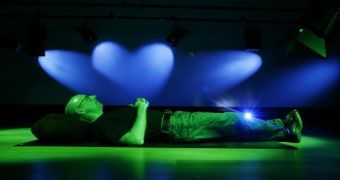A psychology professor from the Health and Human Sciences Research Institute at the University of Hertfordshire has built a room that is a mix of multimedia features linked to relaxation. Richard Wiseman has constructed it based on the previous research on the relaxation topic, and, in doing so, tried to add every factor possible, involving all the senses in a calming experience. The room is lit in a glade-green light tone, while the delicate mats provided with fluffy pillows smelling of lavender are more than welcoming for stressed visitors.
An artificial clear sky hanging overhead can be gazed upon at will, while wallowing in the soothing sound of music composed especially for the event. “Research suggests that the subdued green light enhances the production of dopamine in the brain and provides a calming sensation. In addition, the artificial blue sky helps create a mild form of sensory deprivation that will help them turn their attention inward and distract them away from daily stress,” explains the professor.
The musical background is also provided by a professor (of music, this time) from the same university, Tim Blinko. “Richard asked me to create a piece of music with a slow and distinct rhythm, low frequency notes, and no sudden changes in tempo,” Blinko explains. “I have completely re-written a piece especially for this project. It features a solo soprano voice, chosen for the soothing properties of the human voice, together with a Tibetan singing bowl, used in meditation and a string ensemble.”
The researchers involved in the project hope that it will prove successful, and that this success will draw more attention on the benefits of relaxation. Also, they hope that this will convince more scientists to perform more thorough studies on the topic, but also regular people to use the presented methods to fight stress individually, at home.
The room is currently being exhibited as part of a showcase at the de Haviland campus, which will end tomorrow, and it can accommodate up to 10 persons at a time for 15-minute sessions.

 14 DAY TRIAL //
14 DAY TRIAL //